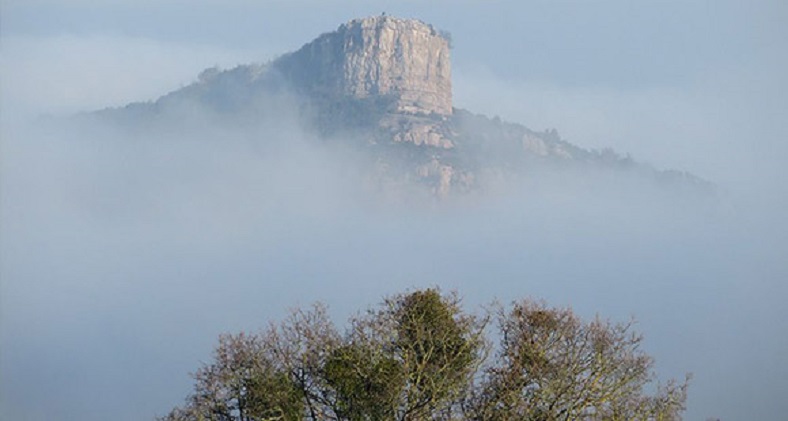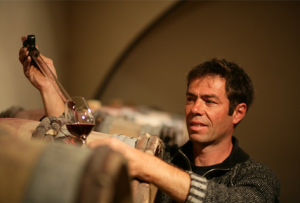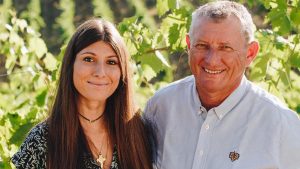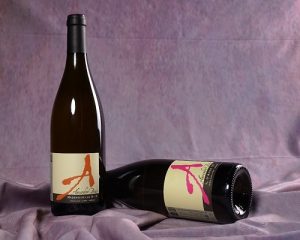
Jean-Philippe and Jean-Guillaume Bret have been a force for excellence in the Mâconnais, pushing their wines to the region’s heights via Domaine de la Soufrandière as well as their trading company. Their talent and commitment come through in each and every one of their beautifully mineral cuvées, as well as their great respect for the earth. We spoke to them to find out more.
Inheriting the earth
It was in the year 2000 that Jean-Philippe and Jean-Guillaume Bret took over the family’s Domaine de la Soufrandière. It first came into the hands of the Brets in 1947, when Jules Bret – a doctor of medicine and paternal grandfather to the brothers – settled at the domain. Located in Vinzelles, in the southern Mâconnais, the vineyards covered just 4 hectares of the Pouilly-Vinzelles appellation at the time, growing on the ‘Les Quarts’ and ‘Les Longeays’ climats. They had a sharecropping arrangement, with the Vinzelles cooperative taking care of the harvest and the selling of the cuvées.
The Bret brothers grew up in the outskirts of Paris but spent all of their holidays in Vinzelles with their grandparents. These are idyllic recollections for Jean-Philippe and Jean-Guillaume, smattered with memories of tranquil fishing and mushroom-picking, where the wild fauna and flora had been left to flourish naturally.
“This desire to return to Vinzelles and take up the family domain was a childhood dream. Once planted, the idea couldn’t be stopped, and we took a little time after our viticulture studies before committing to the domain definitively,” explains Jean-Philippe.
After gaining insightful experience in Burgundy, California, the Loire Valley, and the Rhône, the Bret brothers decided it was time to return home. In 2000, the domain’s vines covered 4.5 hectares in Pouilly-Vinzelles (a Mâcon micro-appellation of just 50 hectares). This was also their first vinification year, with a vintage matured and bottle at La Soufrandière, as well as the beginning of their venture into organics and biodynamics.
As time went on, their land grew with their ambitions. They acquired two Mâcon-Vinzelles parcels in 2004, including the famous Clos de Grand-Père. Then in 2006 and 2008, the domain took on three hectares in the Beaujolais-Leynes appellation. All of the vines, with ages ranging from 25 to 70 years old, are magnificently located in the mid- and upper- sections of a chalk and clay slope with perfect exposure to the south-east.
The Bret Brothers saga
The following year, Jean-Philippe and Jean-Guillaume founded their trading activity that they named Bret Brothers. This was a project that they gradually put together, taking inspiration from their experiences with other domains and vignerons. Their key objective with the négoce is to express the quintessence of Burgundy’s southern terroir. “The Bret Brothers négoce allows us to vary our range with chalky terroirs that are all different. The nice thing about having the négoce is that we can vinify grapes grown over an hour’s drive away. That sort of thing is usually difficult to follow.” Determined to keep everything top quality, the brothers have a few specific criteria to uphold: the grapevines are certified organic, micro-parcels of old vines are carefully selected, harvests are carried out by hand, the fruit is vinified with native yeasts, then maturation takes place in their cellar. Altogether, fulfilling these requirements allows them to craft négoce wines of the same quality as those at Domaine de la Soufrandière. The Bret Brothers produce around twenty exceptional micro-cuvées in small quantities, and these wines are characterised by freshness, tension, and a sincere expression of their terroir.
Respect for man and nature
Since 2000, the vineyards have been worked organically and biodynamically, with certification for these obtained in 2006. Aside from the ploughing, work is carried out manually in order to avoid damaging the soil. In the winery, the cuvées are vinified with native yeasts and are pressed gently for the sake of preserving the fruit’s character. The vinification process is natural, and the wine is then matured in either oak casks or stainless steel vats.
Jean-Philippe’s eyes were opened to the possibilities of biodynamics back in 1998 when he was working with Dominique Lafon. “It was then that I made the link between viticulture and my environmental awareness of river damage. By tasting regularly, we noticed how the biodynamic wines had a different balance, with more acidity and lingering longer on the palate; they’re easier to drink. We started our biodynamic venture then, and we didn’t go wrong!” After three years of testing out these methods, the brothers decided to apply for official certification. This acts as proof for the buyer, but it’s also a gesture to demonstrate how it’s possible to craft good biodynamic wine.
Following a biodynamic philosophy also allows the brothers to manage Burgundy’s increasingly volatile weather conditions thanks to a more vigorous focus on the life of the vines. For Jean-Philippe, working closely with the eco-system and nutrient-rich soil is a short-term response to the climate crisis.
“Our aim is always to craft wines expressing a grape that grows in living soil, and that reflects the work carried out in the vineyard.” And this work certainly comes through, with the particular features of each parcel revealed throughout the nuances of their micro-cuvée range. No chemical additives are used during vinification apart from a minimal dose of sulphites. The Brets aren’t out to make exuberant wines, but something more deeply vibrant, leaning into the emotion of the produce and its easy-drinking side. The wine’s acidic underscore is what calls you to pour a second glass. “Our wines are supposed to be flavourful, inviting an experience to share without hassle or too much waiting.”
Environmental considerations aren’t the only thing the Brets hold dear; they recognise the central importance of their team. “We’re lucky to work with a small team of ten people who are all dedicated and involved in biodynamics.” This human element of wine making is fundamental to the brothers, as it creates employment, nurtures team spirit, encourages exchange and allows them to taste together. “The harvest is much more enjoyable and festive thanks to this social aspect. We’re lucky to have inherited these vines from our family, so we want to share our wealth and passion.” And this is a passion they certainly succeed in passing on, whether it’s to collaborators, trainees or, indeed, valued clients.
Let’s conclude this exciting interview with the words of Jean-Philippe: “Being a vigneron is demanding but wonderful, rich in encounters, heritage, and sharing.”
A passion that we share at iDealwine 😊



